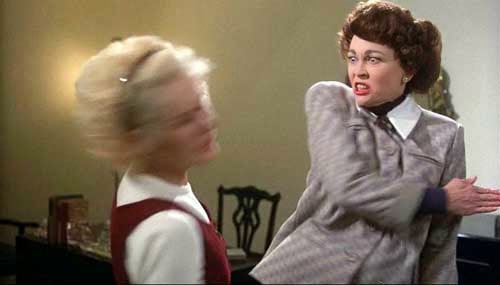This week, In Media Res features topics on 'Domestic Abuse in Movies & Television' that runs through Friday. 360 Degrees will follow the insightful contributions of my colleagues.Today, Wednesday, Roberto Carlos Ortiz presents 'Mommie Dearest Remixed: Child Abuse as Camp.'
Ortiz argued that the repetition or recreation of certain actions, phrases or scenes in different videos remind us that images of abuse in fiction films are only performances, edited to elicit specific responses from audiences.
I have considered the idea that "abuse in fiction films are only performances" from a number of perspectives. Yet, I cannot imagine the experience being benign. Particularly if, as Ortiz reported, one participates in the film vicariously.
I have two reasons for believing this is not harmless: One, though cognitively we know we are viewing fiction, subconsciously the mind perceives the images we see as real. Two, in the case of 'Mommy Dearest' the violence was/is real. It happened to a little girl named Christina. The story line is real. The mother is real. The damage done in that family is real.
Otiz argued that the audience is not laughing at the abuse but, rather, the repetition of exaggerated gestures. However, it is unclear to me how abuse can be disassociated from the act of abuse. So, I tried to imagine the target being someone other than a child. Perhaps the child's innocence stood in the way of me enjoying this film. I imagined: a black person being tortured by a racist, a gay person attacked by a homophobic, a woman being attacked by a man. I could not find humor in either of these scenarios -- regardless of how they are remixed or preceded by performance pieces to conduce joviality, etc.
In the case of 'Drunk in Love' and my exploration of it as an adaptation of 'The Taming of the Shrew,' I found it to be a subversive rather than paternalistic project. Nevertheless, the violence in both works is problematic in spite of their overall messages or purposes.
'Mommie Dearest' is told from the perspective of the abuser rather than the victim, which problematizes the original film. Would it have become a camp classic had it been told from Christina's point of view? I don't know. But I would not want to imagine how difficult it would be to see my childhood story of abuse told and re-told to laughing audiences. So there's that level of violence.
It just doesn't work for me. But the effects Ortiz talked about, which are used in the re-mixed film, would work to make non-violent dramas funny.
Click 'Mommie Dearest Remixed: Child Abuse as Camp' to read Ortiz's curated post and comments on this important subject.
Is violent camp funny?
Ortiz argued that the repetition or recreation of certain actions, phrases or scenes in different videos remind us that images of abuse in fiction films are only performances, edited to elicit specific responses from audiences.
I have considered the idea that "abuse in fiction films are only performances" from a number of perspectives. Yet, I cannot imagine the experience being benign. Particularly if, as Ortiz reported, one participates in the film vicariously.
I have two reasons for believing this is not harmless: One, though cognitively we know we are viewing fiction, subconsciously the mind perceives the images we see as real. Two, in the case of 'Mommy Dearest' the violence was/is real. It happened to a little girl named Christina. The story line is real. The mother is real. The damage done in that family is real.
Otiz argued that the audience is not laughing at the abuse but, rather, the repetition of exaggerated gestures. However, it is unclear to me how abuse can be disassociated from the act of abuse. So, I tried to imagine the target being someone other than a child. Perhaps the child's innocence stood in the way of me enjoying this film. I imagined: a black person being tortured by a racist, a gay person attacked by a homophobic, a woman being attacked by a man. I could not find humor in either of these scenarios -- regardless of how they are remixed or preceded by performance pieces to conduce joviality, etc.
In the case of 'Drunk in Love' and my exploration of it as an adaptation of 'The Taming of the Shrew,' I found it to be a subversive rather than paternalistic project. Nevertheless, the violence in both works is problematic in spite of their overall messages or purposes.
'Mommie Dearest' is told from the perspective of the abuser rather than the victim, which problematizes the original film. Would it have become a camp classic had it been told from Christina's point of view? I don't know. But I would not want to imagine how difficult it would be to see my childhood story of abuse told and re-told to laughing audiences. So there's that level of violence.
It just doesn't work for me. But the effects Ortiz talked about, which are used in the re-mixed film, would work to make non-violent dramas funny.
Click 'Mommie Dearest Remixed: Child Abuse as Camp' to read Ortiz's curated post and comments on this important subject.



